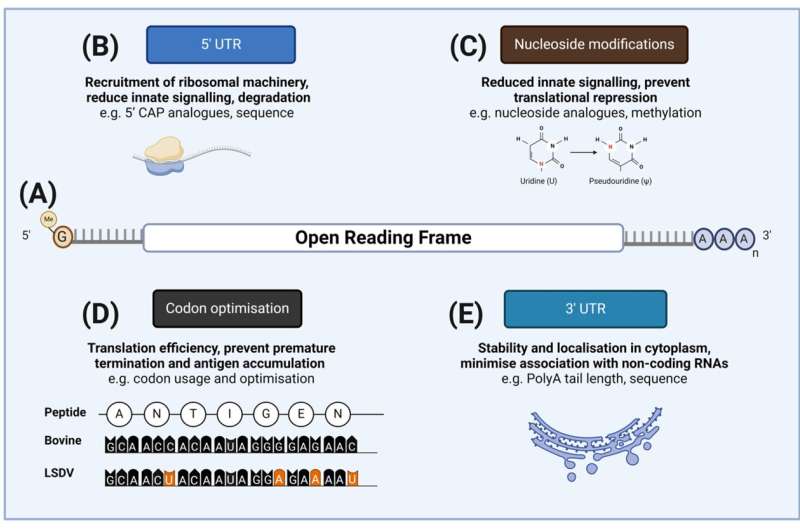This article has been reviewed according to Science X's editorial process and policies. Editors have highlighted the following attributes while ensuring the content's credibility:
fact-checked
trusted source
proofread
Can mRNA vaccines help boost livestock production?

University of Queensland researchers say mRNA vaccine technology could play an important role in boosting livestock production to meet global food demands.
UQ's Professor Tim Mahony said it was vital for the livestock industry to take advantage of the unprecedented investment in mRNA vaccination technology triggered by the COVID-19 pandemic. The study is published in the journal Vaccines.
"Infectious diseases are limiting the production of edible protein for human consumption, which is affecting both the quality and quantity of the product," Professor Mahony said.
"One benefit of mRNA vaccines is the flexibility to make changes when new variants of diseases emerge, which makes it an ideal solution for reducing losses within livestock production systems in the future.
"For a complex disease like bovine respiratory disease, a conventional approach would require us to make a vaccine for every individual pathogen.
"But an mRNA vaccine allows us to pull apart those pathogens and select which ones to incorporate into a singular vaccine."
A report by research firm Oxford Analytica commissioned by international not-for-profit HealthforAnimals estimated $US982 million was lost each day through productivity losses in livestock industries.
It also found every percentage point reduction in beef cattle losses due to disease could provide enough food to meet the needs of 317 million people, while a 10% reduction in disease could substantially reduce greenhouse gas emissions.
Professor Mahony said the challenge was for livestock industries to harness the rapid advances in vaccination to address key diseases affecting production.
"For some neglected diseases, identifying the protective antigens remains a critical knowledge gap," he said.
"Currently, there are no mRNA vaccines approved for use in food-producing animals.
"As these vaccines are developed for animals, they will be subject to scrutiny by multiple agencies as part of the strict approval processes for use in livestock.
"mRNAs are essential molecules in the cells of all animals and plants which we consume in our food.
"Despite this, consumer safety will be an important consideration before mRNA vaccines are approved for use in livestock.
"The major challenge is for governments, peak industry bodies and veterinary health companies to make the investment required to develop mRNA vaccines for ruminants and other livestock.
"As we saw with the pandemic, if you put enough resources in the one spot, things can happen very quickly."
More information: Timothy J. Mahony et al, Can the Revolution in mRNA-Based Vaccine Technologies Solve the Intractable Health Issues of Current Ruminant Production Systems?, Vaccines (2024). DOI: 10.3390/vaccines12020152
Provided by University of Queensland




















